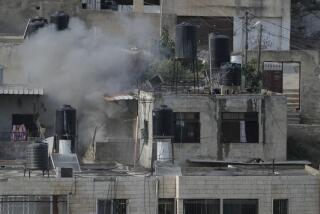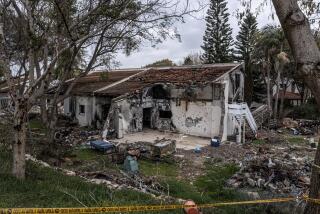Probe of Afghan toll planned
KABUL, AFGHANISTAN — After a week of tense public disagreement over the civilian casualty toll in a U.S.-led raid in western Afghanistan, officials with the United Nations, the Afghan government and the NATO-led force in the country said Saturday that all sides had agreed to a joint investigation.
As many as 90 civilians, about two-thirds of them children, were killed in the Aug. 22 raid in Herat province, the U.N. has asserted; the Afghan government’s count is slightly lower.
But U.S. military officials have sharply disputed those numbers, saying they believe that about 30 people were killed in the early morning strike on the village of Azizabad, only five of them civilians.
In the wake of the raid, President Hamid Karzai made his most strongly worded appeal yet for greater caution by Western troops during combat operations in populated areas. He said the deaths and their circumstances warranted a broad reexamination of operations by coalition troops, who are trying to contain an increasingly powerful Taliban-led insurgency.
If the U.N. estimates are borne out, the toll would represent what is believed to be the greatest number of civilian fatalities caused by Western troops in a single incident since the Afghan conflict began nearly seven years ago.
The issue is sensitive for all sides. The Afghan government is keenly aware that such casualties erode public support for the Western troop presence and heighten anger toward the U.S.-backed Karzai administration.
Western military officials, for their part, are deeply frustrated by what they describe as a Taliban propaganda war using civilians as pawns. Taliban fighters, they say, routinely place civilians in harm’s way by using populated areas to stage strikes against Western forces, as well as carrying out suicide bombings that are far likelier to kill civilians than better-protected troops.
Coalition officials also accuse the militants of trying to hide their own battlefield casualties by falsely labeling them as civilian dead. Further clouding the issue, compensation payments offered to the families of those accidentally killed by Western and Afghan troops sometimes spur false claims, military officials say.
Continuing tensions among the parties were evident in the fact that plans for a joint probe were announced by the U.N. and the North Atlantic Treat Organization’s International Security Assistance Force -- not the separate U.S.-led coalition, whose forces took part in the raid.
U.S. military spokesmen in Afghanistan have said the incident was under investigation by American forces. Although full results of that inquiry have not been released, senior Pentagon officials were quoted last week as saying the American conclusions suggested that the death toll was about one-third of that reported by the U.N. and Afghan authorities, and that nearly all those killed were militants.
Because much of the fighting takes place in remote areas, disparate accounts of a given incident are not uncommon. But this incident was unusual in the starkly different accounts that emerged, not only of the death toll and the number of noncombatants involved, but also the circumstances of the raid.
Some Afghan officials have suggested publicly that a clan had tricked U.S. special forces, who conducted the raid with Afghan commandos, into carrying out the strike against one of its rival clans.
But U.S. authorities have maintained that Taliban fighters were in the area, and that the raiders’ main target, a commander named Mullah Siddiq, was among the militants killed.
U.S. officials said their investigations in the hours immediately after the strike had turned up no evidence of large-scale civilian casualties, such as freshly dug graves. But villagers said it took time to extract bodies from the rubble of more than a dozen family compounds, where they said a large extended clan had gathered for a memorial service.
As the days have passed, the confusion has only deepened.
The U.N. mission in Afghanistan had angered U.S. authorities by releasing a statement four days after the raid saying its investigators had found “convincing evidence” that the raid killed 90 civilians, including 60 children and 15 women.
U.N. spokesman Dan McNorton said Saturday, “We absolutely stand by our investigation and our statement,” but also welcomed the joint probe.
“This must be a broad-based investigation,” he said.
None of the parties have produced definitive evidence to back up the various claims. Brig. Gen. Richard Blanchette, chief spokesman for the International Security Assistance Force, told the Associated Press that the joint inquiry would seek to reconcile “numbers which are way too far apart right now.”
Blanchette said he hoped for a speedy resolution, but he and McNorton said discussions about how to proceed were still underway.
--
Special correspondent Faiez reported from Kabul and Times staff writer King from Istanbul, Turkey.
More to Read
Sign up for Essential California
The most important California stories and recommendations in your inbox every morning.
You may occasionally receive promotional content from the Los Angeles Times.









